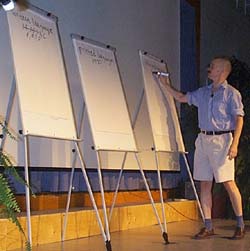Minutes by Ebbe Munk
Speech by Alexander Bard, musician and sociologist, Billingehus, Skövde,
Sweden, 16 September 2000. Alexander Bard is author of the Internet sociology
book best-seller "Netocracy". The question of the book is: "Where do the
interactive media fit in?"
Mankind started talking 100,000 or 140,000 years ago. An advantage of
language is, that it controls morals, so we stopped fucking all of the time,
giving better and more controlled people.
Mankind started writing in Mesopotamia 11,000 years ago. Why in Mesopotamia,
and not in China nor in Mexico? Because Mesopotamia was a very rich country with
perfect conditions, lot of cattle, pigs, chicken, wheat, etc. The newly created
villages needed rules and created the idea of property. Written language was
used for laws, i.e. civilisation.
Only a few people could read and write. The written language and the need for
a power ruling the society created the aristocracy ("I am better than you"). To
manipulate other people you need a story telling "because somebody said so".
This is the invention of God.
The monarch was created as the aristocrat of aristocrats. The monarch's role
is to tell what is good for moral and the society. Ordinary people get the
promise of a reward after death. In all societies you will always find a story
of eternity.
The printing press was invented in China, but was taken into use in large
scale in Europe around 1450, when the price of paper lowered. Suddenly there was
a need for more people to know how to read. Now, there was a basis for building
cities, and books told people how to live in cities.
This is a major paradigm shift, and it created the bourgeoisie and the
working class. Again, the workers were told a story, and "Manhood" replaced
"God".
The ability of reading created the feeling of individuality, because any
person is reading and understanding by itself. Until 1750 we never thought of
ourselves as individuals. The bible was the first book to be printed, but
printing afterwards killed the religion.
The hand-written books were in Latin language. The printed books were in
local languages as well, for example French (the winning dialect from the French
area) and German (Luther's invention, a local dialect from Hannover).
Formerly, the educated people were placed in monasteries. Now, they are
locked up in universities instead.
The books printed in local language were basis for the upcoming nationalism.
Nationalism was introduced as the new religion, interpreted by the state. The
new ideology is "progress". It is a new illusion, a way of controlling
people.

There is no fundamental difference between radio, television and printed
books – they are all one-way media.
Since 1970 it has been possible to communicate with interactive media. Now
attention is the scarcest resource, and capital is not the fundament anymore.
Money is not the crucial power anymore, because you can't buy yourself into a
network. Money is second-rated, and what is bought for money obtains a loss of
credibility. This is a major power shift.
The society is divided between
- The netocracy – those who are connected in interactive networks, and
- The consumtariat – those who thinks that interactivity is selecting
channels on a television
Individualism has been abandoned, and instead networking is in. The old
identities are worthless, and the new identity will be defined in subcultures.
- Who has got the power? Especially the curator, the one who sorts the
information.
- What is his reward? Dynamics.
- What will be the next? We don't know. We'll be obsessed with dynamics.
In a democracy the majority rules and works. But it reigns a closed space, a
nation state.
But the nation state has vanished. Will you die for Sweden? No – the nation
state is dead. It means, that we have a plurachy where the minorities can walk
out like it has always been in the plucratic culture in the United States. If a
group did not like the others, they went west.
Maybe a network can convert into a company? Surely, a company can convert
into a network.
Money is not important for the upper class anymore. You need money as you
need food, but it is not the most wanted resource anymore.

